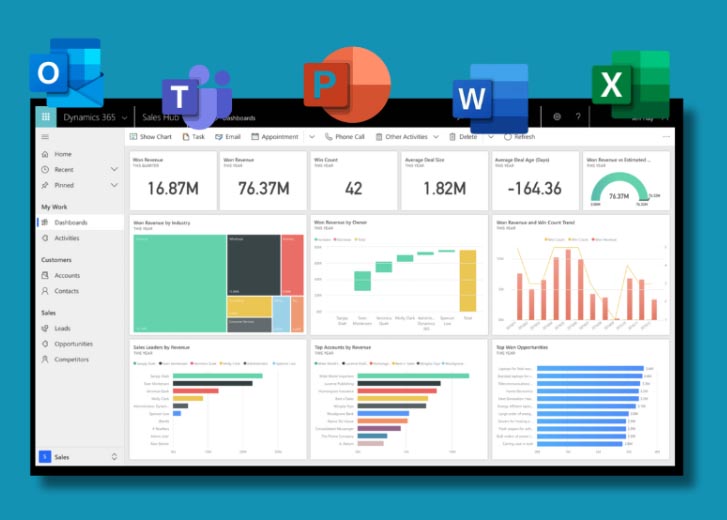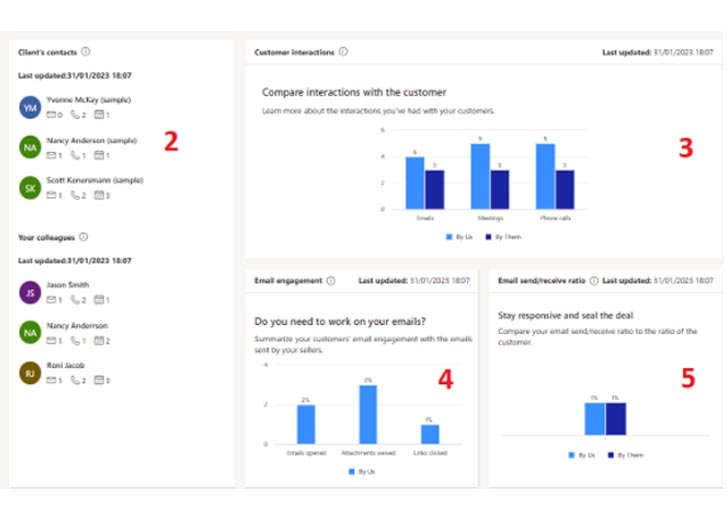What is Dynamics 365 Sales?
Dynamics 365 Sales Definition
Dynamics 365 Sales, as part of the Dynamics 365 CRM platform, is a dedicated module for automating and enhancing the sales process. It is designed to meet customers at various stages of the sales funnel, activating and improving digital sales and collaboration for your organization. With a focus on streamlining sales activities, Dynamics 365 Sales provides tools and features that enable your sales teams to efficiently manage leads, opportunities, and accounts. This automation helps in lead management, opportunity tracking, and forecasting. Furthermore, Dynamics 365 Sales offers valuable sales insights and analytics, enabling sales professionals to make data-driven decisions. By automating the sales journey and providing access to real-time sales data, Dynamics 365 Sales significantly boosts the productivity of your sales team and facilitates the development of strong, enduring customer relationships.
How Can Small and Large Businesses Measure the ROI of Dynamics 365 Sales

Analyzing the expenses and advantages of a Customer Relationship Management (CRM) solution like Dynamics 365 Sales is necessary to calculate the Return on Investment (ROI). Here’s how companies might go about calculating Dynamics 365 Sales’ return on investment.:
Define Key Performance Indicators (KPIs)
The essential indicators that are important for your sales processes and customer management should be identified and established. Several possible KPIs include:
- Lead conversion rate
- Sales cycle duration
- Customer acquisition cost
- Customer lifetime value
- Sales per representative
- Customer satisfaction scores
Track and Analyze Data
Utilize the robust analytics capabilities of Dynamics 365 Sales to collect and analyze data related to your KPIs.
- Sales Data: Assess sales before and after Dynamics 365 implementation.
- Customer Data: Evaluate customer engagement, satisfaction, and retention metrics.
- Process Efficiency: Analyze how sales processes have improved or streamlined.
Evaluate Financial Metrics
- Calculate the cost savings brought forth by increased productivity and decreased resource consumption.
- Revenue Growth: Examine any sales growth to see if it can be linked to the use of Dynamics 365.
- Measure any increase in sales activity and transactions closed per sales representative to determine sales productivity.
Assess Qualitative Benefits
- Customer satisfaction: Track changes in relationships with and among customers.
- Operational Visibility: Assess how Dynamics 365 has changed your understanding of how sales operations and customer management are managed.
Continuous Monitoring
- Regularly evaluate the KPIs and adjust strategies accordingly.
- Ensure continuous feedback from the sales team and customers to optimize the usage of Dynamics 365 Sales.
Comprehensive ROI Evaluation: Blending Quantitative and Qualitative Benefits of Dynamics 365 Sales
The return on investment (ROI) of Dynamics 365 Sales consists not only of monetary advantages, but also of enhanced capabilities, enhanced insights, and improved customer relationships. Therefore, an effective evaluation combines quantitative financial metrics with qualitative enhancements in operations and customer engagements. Remember to conduct this analysis on a periodic basis and use the results to continually improve your CRM strategy and implementation.
![]()
Foster the right relationships
Empower sellers to build relationships with the right buyers, use recommendations and insights based on actual customer needs, and move deals forward by combining the power of LinkedIn Sales Navigator and Dynamics 365 for Sales.
Is Dynamics 365 Cloud-Based?
Microsoft’s Dynamics 365 Sales is a cloud-based CRM (customer relationship management) solution. It is a component of the larger Dynamics 365 platform, which provides a variety of cloud-based applications for various business functions, including finance, operations, and customer service.
Being cloud-based enables Dynamics 365 Sales to offer numerous advantages, including accessibility from any location, automatic updates, scalability, and the ability to integrate with other cloud-based services and applications.
Dynamics 365 Sales enables businesses to manage, analyze, and leverage their sales data without the need to maintain on-premises infrastructure and software, making it a useful and effective tool for sales teams of all sizes.
Dynamics 365 Sales on the Go
Users can access Dynamics 365 Sales on mobile devices. Microsoft offers a mobile app for Dynamics 365 Sales that lets users access sales data and use numerous functions on the move. The mobile software lets users maintain client data, update sales possibilities, and complete other CRM duties from their phones, boosting productivity.
The Dynamics 365 mobile app is available for iOS and Android, making it accessible on many devices. The user-friendly app allows users to access and interact with their data offline and synchronize changes when connectivity is restored.
This mobile access helps salespeople and other professionals who are constantly on the go manage customer connections, access essential data, and keep in touch with their team.
RELATED ARTICLES
- Dynamics 365 CRM Redefines Customer Engagement
- Why CRM Implementations Fail 80% of the Time
- How Microsoft Has Been Leading the CRM Revolution
- Advantages of Microsoft Dynamics 365 BC & D365 Sales (CRM) Integration for Manufacturing and Distribution
- What is the Future of CRM and ERP Integration?
- How to Leverage Microsoft Dynamics 365 Sales for Boosting Your Revenue
- Understanding Dynamics 365 CRM for Customer Retention
D365 SALES BLOGS
- 6 Benefits of Integrating Dynamics 365 Sales with Microsoft 365 (Office 365)
- Top 13 Dynamics 365 Sales Features to Boost Your Sales Team’s Productivity
- AI-Powered Insights: Revolutionize Your Sales with Dynamics 365 Sales
- The Power of Dynamics 365 Sales: Boosting Your Revenue
- Customizing Dynamics 365 Sales for the Unique Needs of Retailers
What significance do KPIs have in sales?
Sales KPIs are crucial because they provide measurable success benchmarks. They help organizations monitor progress, identify areas for improvement, and optimize their sales strategies through data-driven decisions.
How do I select the appropriate KPIs for my organization?
Aligning your KPIs with your organization’s objectives is a necessary step in selecting the most suitable KPIs. Identify your primary objectives, such as increasing revenue, decreasing customer churn, or enhancing lead conversion rates. Then, choose KPIs that directly quantify progress toward these objectives.
Can Dynamics 365 Sales be utilized by modest businesses?
Without a doubt! The scalability and adaptability of Dynamics 365 Sales make it suitable for enterprises of all sizes. Small businesses can benefit from the CRM’s prospect management, relationship nurturing, and sales performance tracking capabilities.
How frequently should I evaluate my key performance indicators and reports?
Regular evaluations are necessary to maintain agility and responsiveness. Depending on the dynamics of your business, monthly or quarterly evaluations are typical. However, be receptive to modifying your frequency in light of changing circumstances.
What is the first stage in implementing KPI tracking in Dynamics 365 Sales?
The initial stage is to clearly define your objectives and KPIs. Once you have defined objectives and metrics, you can configure Dynamics 365 Sales to begin tracking and analyzing your sales performance.
Ready to approach technology differently and start your Digital Transformation journey?
Since 1987, thousands of organizations have partnered with TMC to rethink their business processes and technology to empower their employees to achieve more, improve customer experience & adapt to the ever-changing global economy.







